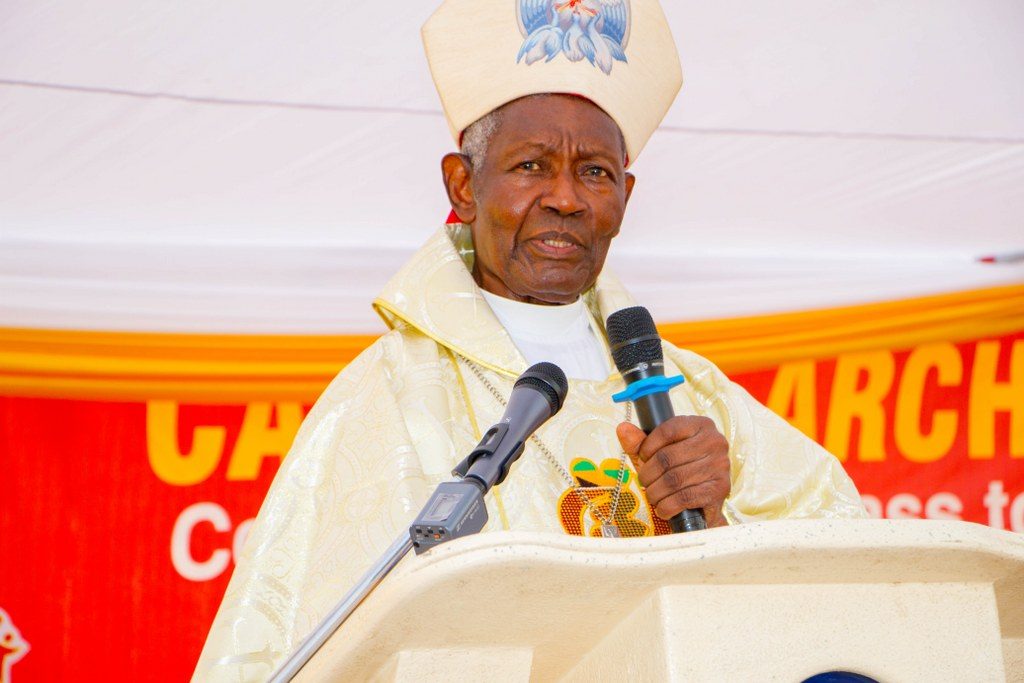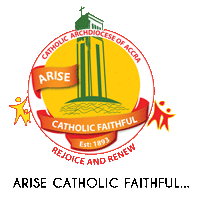
HOMILY OF BISHOP ADANUTY ON 125TH ANNIVERSARY OF FIRST MASS IN ACCRA
31 JANUARY 2018
———–
Exodus 13, 17-18, 21-22.
Hebrews 13, 7-16.
Luke 8, 22-25.
Dear Brothers and Sisters in Christ,
We are celebrating today the 125th anniversary of the first Catholic Holy Mass in Accra.
As we gather here for this event, we cannot but think of the handful of people gathered in the house of Chief John Quartey on Accra High Street and try to imagine what was going on in their thoughts and imaginations.
The two SMA fathers, Otto Hilberer and Eugene Raess, sent by their religious superiors, were here to carry out the missionary mandate of Jesus Christ (Mt. 28, 19-20) to go and make disciples of all nations … They must have understood, already then, that the Christian Church is, by its very nature, missionary. They were convinced about the need of their work of evangelization and were not daunted by the fact that missionaries of other Christian denominations had preceded them to the then Gold Coast.
We admire their zeal, their courage to accept hardships, their readiness to embrace this mission in a territory where they were very likely to meet early death through yellow fever. We admire above all their faith in Jesus Christ and their commitment to promote his saving work.
Today we commend to the Lord the souls of all the departed missionaries, of the lay faithful who helped them settle down and facilitated their work in various ways to plant the seed that has grown to be the Catholic Church in the Archdiocese of Accra. We pay special tribute to the lay faithful whose perseverance kept the Church alive when, barely two and a half years after the first Mass was celebrated, Accra had to remain without resident priests for some 30 years because the two resident priests had to move to Fanteland where yellow fever had caused havoc among the missionaries in the older Churches around Cape Coast. There is no doubt that through those lay faithful the Lord assured that the torch of faith, lighted by the missionaries, kept burning.
Although this sounds like a vote of thanks, I can assure you that it is not meant to be so. I only want to draw our attention to the obvious fact indicated in Is. 26, 12 that all that has been accomplished by these people, each in their own significant and insignificant ways, have been accomplished by the Lord. To the Lord, therefore, be the glory and thanksgiving.
It is indeed the Lord who decides who should do what in this world and he enables his sons and daughters to carry out the missions assigned to them. He is the Lord of the past, of the present and also of the future, the Lord of history.
Let us look at the first reading from the book of Exodus. When God led his people out of Egypt towards the promised land, he did not lead them by way of the shortcut along the coast, but rather by the roundabout way of the wilderness towards the Red Sea. The shortcut would have brought them very soon face to face with the warlike Philistines. With Egypt so near behind them, the temptation to go back there would have been too compelling for the people. That was one reason. Another reason, as we can gather from looking back on the past, was that God wanted to train them by means of all the experiences they went through in the wilderness. By following the long way chosen by God, the people of Israel have learned that the attainment of freedom and independence is a gradual, painful process through which God’s people must pass in order to appreciate freedom.
God made his presence felt during the journey, leading the people by a pillar of cloud during the day and especially by a pillar of fire by night. Lions would not have needed the pillar of fire in order to see. God satisfied the need of his people.
God is in control of our life, he is truly interested in our well-being and will help us achieve his goals in us.
Each generation in the Church must experience God’s presence and renew its faith in him. Each generation must experience the exodus and declare its faith in the God of freedom. Each member of God’s people, each one of us here, will be given the chance of realizing that God is not only our God, but my God, as Thomas did. Each will be educated by the Lord to come to the realization that it is he, the Lord, who accomplishes all that he, the creature, accomplishes.
The Gospel reading tells us of Jesus and his disciples crossing by boat to the other side of the Sea of Galilee when a storm arose, putting their lives in serious danger. We know very well that the gospel narratives are not newspaper reports of events, like the sort you would read in the Daily Graphic or Ghanaian Times. They are selected and reported in order to teach something relevant to the good news that Jesus has brought to the world.
Here we find the boat on a stormy sea; Mark tells us the crossing started in the evening; so they were now in darkness. They were crossing over into the territory of the Gerasenes, who could certainly not have been Israelites, because, for one thing, we know from the episode which follows today’s reading, that the Gerasenes were breeding pigs, which were unclean animals for the people of Israel. What happened that night was of great significance in the mentality of those days, because the sea was considered as the home of all the evil spirits; well, we in Ghana know that mammy water is also there.
In the interpretation given to this event the boat is seen as the Christian Church complying with the missionary mandate of Jesus and therefore going to the other side of the lake, into the territory of people Israel referred to as the goyim; since they did not know Jahweh, they were pagans. So the Christian community was going out to the whole world to proclaim the good news. The storm represents the various difficulties the early Church had to face: not only from outside but also from within its own ranks; from outside, such as suspicion, rejection, persecution and death; from within: weakness of some members, differences of opinion regarding the demands of the new life, etc.
The disciples of Jesus had to struggle hard in order to remain faithful to the Lord’s teaching; we know how they had to hold the first Council of Jerusalem to decide what demands to impose on the new believers who were not Jews; were they to undergo circumcision?
The strange situation of Jesus being fast asleep in the midst of all this turmoil shows how the disciples had to face the new situation in which the Lord Jesus was no longer physically present among them the way he used to be. They still had to come to terms with calling on Jesus as before, talking to him as before, in short, they had to remain in communication with Jesus, namely praying to him; the reproach of Jesus to the disciples about their faith indicates the need for Christians to express this faith in him always, not only in critical moments, not only to ask for miracles. It is an evil generation that knows Jesus only as worker of spectacular miracles.
Having faith in Christ does not show only when we are faced with troubles beyond us, not only when other helpers have failed us, not after we have vainly had recourse to humans and spirits who don’t know their right from their left.
Do we show faith only when God’s presence is seen through spectacular miracles? Or are we able to see also the miracles of every day and thank the Lord for them?
We learned from the first reading from the Book of Exodus that God is in control of our life, he is truly interested in our well-being and will help us achieve his goals in us. In the same way, we learn from the gospel episode also that Jesus, the Lord, is in control. He is the God who alone has power over the sea and the waves, over all evil forces. Our God does not sleep and does not need to be awakened.
The second reading of today, from the Letter to the Hebrews, brings us down to our Archdiocese, to our parishes and stations, where we try to give living expression to our faith in God and in his Son Jesus Christ. The sacred author tells us, among others: “Remember your leaders, those who spoke the word of God to you; consider the outcome of their way of life, and imitate their faith. Jesus Christ is the same yesterday and today and forever…”
If we are gathered here today, it is also to honour those valiant leaders who spoke the word of God to our grandfathers and grandmothers. We are committed to imitating their faith, which was the driving force that enabled them to face and surmount all the difficulties in their path of evangelization. At the same time, we are committed to keeping intact our faith in the person of Jesus Christ who remains the same, yesterday, today and forever.
It is in this spirit that the Archdiocese of Accra is committed to continuing the work of evangelization, mindful that while the faith remains always the same, the manner in which it is presented and preached may vary according to the times and places. The way people think and communicate keeps changing
It is also for this reason that the Archdiocese has been holding synods periodically in order to make sure that in carrying out the missionary mandate, she presents the unchanging Christ to a world that keeps changing. In Jn 14, 26 Jesus said to his disciples: “the Advocate, the Holy Spirit, whom the Father will send in my name, will teach you everything and remind you of all that I have said to you.” In this context I see the task of the Spirit as one of reminding the Church of the unchanging truth and teaching her how to present that truth in the changing world. An example is what emerged from the Council of Jerusalem in Acts 15.
Five years ago, when the Archdiocese of Accra celebrated its 120th Anniversary, the theme was: 120 Years of Catholic Mission: Honouring the past, Celebrating the Present, Building the Future.
This year, as we celebrate the 125th Anniversary, the theme is: 125 Years of Catholic Mission in Accra: Renewing Our Commitment to Evangelization.
In both celebrations, the motto/slogan is the same, namely: Arise, Catholic Faithful, Rejoice and Renew.
We have to conclude that the Archdiocese of Accra intends to engage all her Catholic faithful in an effort to renew her commitment to evangelization and doing so in a joyful manner, precisely as our second reading advises in the verse following today’s passage.
My brothers and sisters, we have always to keep in mind that the work of evangelization has been entrusted, by the Lord Jesus Christ, to each and every member of the Church. It is our mission because the Church is, by her very nature, missionary. It is an honour for us to be asked by the Lord to fulfil this mission. It is not we who give the faith to another person; God is the one who gives faith. Ours is, first and foremost, to bring people to meet Jesus as a person, just as John the Baptist did with his disciples, just as Andrew did with his brother Simon, just as the Samaritan woman did with her townspeople. Jesus knows best what to do with them. Ours is only a work of collaboration with God; and let us take note and remember that God does not need our contribution in order to proclaim the message. This is no heresy. We all remember that at the birth of Jesus in Bethlehem, God used an angel to proclaim the good news to the shepherds. We all know that God used a star to proclaim the good news to the wise men from the East. We all know that both at the baptism of Jesus and at his transfiguration, God proclaimed who Jesus was through a voice; and, finally, we all know that it was Jesus himself who evangelized the hostile Saul on his way to Damascus. God does not need our contribution in order to proclaim the message. It is an honour for us to be asked by the Lord to cooperate with him in evangelization. Coming down to our own context, we know the important role played by the British Governor, the Ga Chiefs and perhaps other non-Catholics in facilitating the establishment of the Catholic Church in Accra. It was the Lord himself who planned and executed his plan, using various human instruments to achieve his purpose. To him be the glory and thanksgiving and to the human instruments our appreciation for the fact that they allowed the Lord to make use of them.
Now, let nobody start thinking that if the Lord does not really need us, then we should allow him to do everything. Pope Paul VI has a question for anyone who thinks that way; listen:
“It would be useful if every Christian and every evangelizer were to pray about the following thought: men can gain salvation also in other ways, by God’s mercy, even though we do not preach the Gospel to them; but as for us, can we gain salvation if through negligence or fear or shame- what St. Paul called “blushing for the Gospel”[134] – or as a result of false ideas we fail to preach it? For that would be to betray the call of God, who wishes the seed to bear fruit through the voice of the ministers of the Gospel; and it will depend on us whether this grows into trees and produces its full fruit.” (E.N. 80)
The Lord does not need us in order to proclaim the gospel, but he has given us the privilege and honour to share in its proclamation. Therefore, my brothers and sisters, first of all, we have nothing to boast about, if we have the faith in God and someone else doesn’t have it or doesn’t have it the same way: it is the Lord who gives the grace of faith to a person, not we. Again, therefore, we have no business looking down on anybody or ridiculing anybody who does not have the faith we have. What have we that we haven’t received?
So, the Archdiocese calls on all her faithful to once more renew their commitment to evangelization and to do so joyfully and cheerfully. What you are being called to proclaim is good news, glad tidings. At the birth of Jesus, the angel said to the shepherds: “I am bringing you good news of great joy for all the people.”
Therefore, Arise, Catholic faithful of the Archdiocese of Accra, Rejoice and Renew!
A M E N

